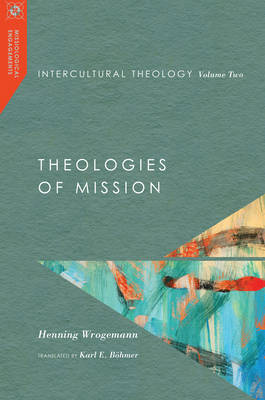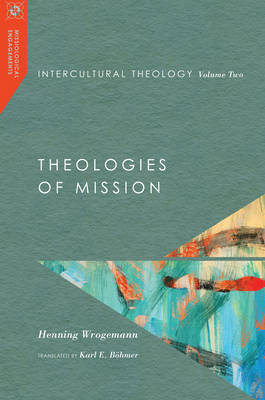
- Afhalen na 1 uur in een winkel met voorraad
- Gratis thuislevering in België vanaf € 30
- Ruim aanbod met 7 miljoen producten
- Afhalen na 1 uur in een winkel met voorraad
- Gratis thuislevering in België vanaf € 30
- Ruim aanbod met 7 miljoen producten
Omschrijving
Christianity is not only a global but also an intercultural phenomenon.
In this second volume of his three-volume Intercultural Theology, Henning Wrogemann turns to theologies of mission. Mission theologies, he argues, are found in a wide range of implicit as well as explicit forms, from the practice of Christian presence by a Pakistani Christian among a marginalized people to the published deliberations of mission scholars in the West. The task of intercultural theology is to investigate and promote awareness of the variety of culture- and context-specific theologies of mission.
From Warneck to Bosch, from Edinburgh to Lausanne to Busan, Wrogemann provides an overview of the theological underpinnings, rationalizations, and visions for mission and its practice. Tracing developments across a range of Christian traditions, movements, themes, and regions of the globe, from Europe and North America to sub-Saharan Africa, Wrogemann presents us with an array of mission theologies across the scope of the modern missionary movement. This rich conspectus is rounded out with the doxological dimension of mission and the varied facets of oikoumenism.
Masterful in its scope and detail, this volume will richly inform the study of missiology and global Christianity. And it is essential reading for doing theology in a multicultural key. In a day when the church in the West struggles to understand and appreciate its missionary legacy and calling, Wrogemann's work sparkles with its deeply informed insights and inspiring vision.
Missiological Engagements charts interdisciplinary and innovative trajectories in the history, theology, and practice of Christian mission, featuring contributions by leading thinkers from both the Euro-American West and the majority world whose missiological scholarship bridges church, academy, and society.
Specificaties
Betrokkenen
- Auteur(s):
- Uitgeverij:
Inhoud
- Aantal bladzijden:
- 475
- Taal:
- Engels
- Reeks:
- Reeksnummer:
- nr. 2
Eigenschappen
- Productcode (EAN):
- 9780830850983
- Verschijningsdatum:
- 9/01/2018
- Uitvoering:
- Hardcover
- Formaat:
- Genaaid
- Afmetingen:
- 152 mm x 229 mm
- Gewicht:
- 789 g

Alleen bij Standaard Boekhandel
Beoordelingen
We publiceren alleen reviews die voldoen aan de voorwaarden voor reviews. Bekijk onze voorwaarden voor reviews.











